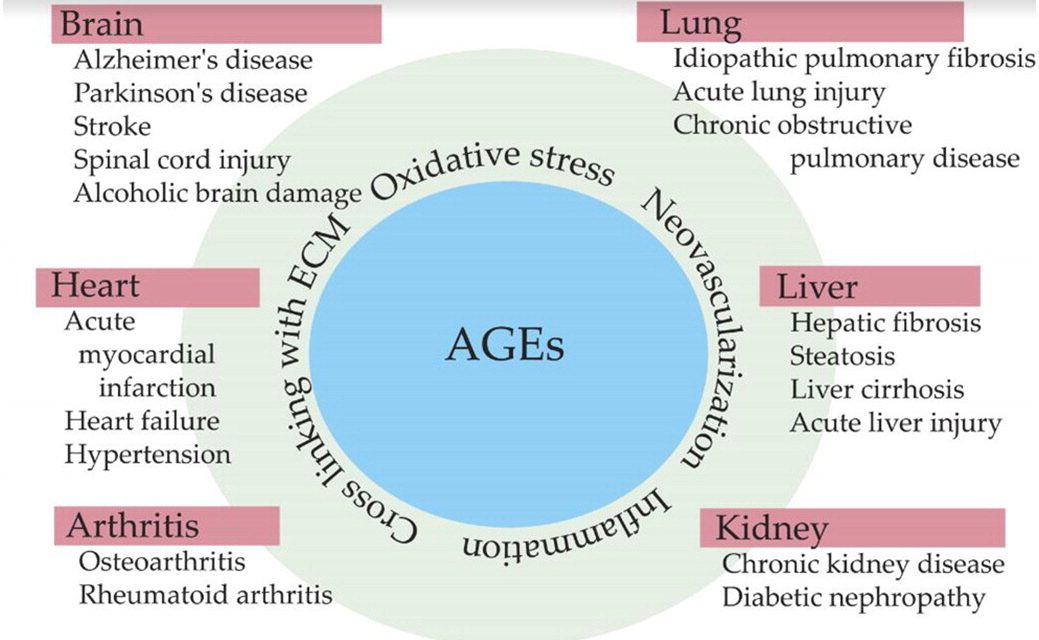In this article:
Glycation Exposed: The Enemy Within
Let’s delve into the shadowy world of Advanced Glycation End Products, a biochemical process that remains largely unnoticed by the average person yet has profound implications for health and longevity. This silent enemy operates under the radar, initiating a cascade of reactions that ‘caramelize’ our cells and tissues, much like sugar does to food. The article aims to shed light on this obscure phenomenon, exploring how these molecular reactions contribute to aging and chronic diseases, and what steps can be taken to mitigate their insidious effects. It’s a call to arms against an invisible adversary that is as fascinating as it is formidable.
Imagine cooking a steak on a pan. As the heat rises, the steak begins to brown and change flavor, a process known as the Maillard reaction. Something similar happens in our bodies when blood sugar levels are consistently high or spike suddenly – it’s called glycation.
Proteins or lipids in our bodies react with excess sugars to form Advanced Glycation End Products (AGEs), which can be thought of as the unwanted “browning” of our cells.
AGEs are not just a byproduct of our body’s natural processes; they are also found in high-fat and high-protein animal-derived foods and can form at an increased rate during cooking, especially at high temperatures. While some AGEs can be absorbed through diet, the primary concern is those produced endogenously (within the body) due to high blood sugar levels.
Why are AGEs bad for your health? Let’s break it down:
Inflammation and Oxidative Stress
AGEs can trigger inflammation and oxidative stress, which are pathways to various chronic diseases.
- Alzheimer’s Disease: Chronic inflammation and oxidative stress contribute to the progressive loss of memory and cognitive function in Alzheimer’s disease.
- Parkinson’s Disease: These hallmarks play a role in the degeneration of dopamine-producing neurons, leading to motor symptoms like tremors and rigidity.
- Amyotrophic Lateral Sclerosis (ALS): Oxidative stress and inflammation are implicated in the motor neuron death characteristic of ALS.
- Huntington’s Disease: Both chronic inflammation and oxidative damage contribute to the deterioration of nerve cells in the brain, resulting in movement and cognitive impairments.
- Multiple Sclerosis (MS): Inflammation and oxidative stress play a role in the demyelination of nerve fibers, causing neurological symptoms in MS patients.
- Cardiovascular Disease: Chronic inflammation can damage blood vessels, leading to conditions such as heart disease, stroke, and hypertension.
- Cancer: Prolonged inflammation can cause DNA damage in healthy cells, contributing to the development of cancer.
- Type 2 Diabetes: Insulin resistance, a hallmark of type 2 diabetes, is influenced by chronic inflammation.
- Rheumatoid Arthritis (RA): An autoimmune disease where inflammation targets joint tissues, causing pain and stiffness.
- Asthma: Chronic inflammation in the airways can lead to asthma symptoms.
- Obesity: An inflammatory diet can trigger low-grade inflammation and contribute to weight gain.
- Endometriosis/Adenomyosis: Inflammation in the uterus or pelvic area causes abnormal tissue growth and menstrual pain.
- Depression: Research suggests a link between inflammation and the development of depression.
Cardio-vascular complications
AGEs contribute to vascular stiffness and complications, especially in diabetes, by modifying proteins like collagen and promoting the entrapment of harmful particles in artery walls.
– **Impaired Organ Function**: AGEs can affect organ function, leading to conditions like chronic kidney disease and Alzheimer’s disease.
– **Aging**: They are implicated in the aging process itself, potentially accelerating the development of age-related ailments.
AGEs and fatty liver disease
Focusing on liver health, AGEs can exacerbate liver diseases by promoting inflammation and fibrosis, which can lead to conditions like non-alcoholic fatty liver disease (NAFLD) and cirrhosis. As the liver ages, its ability to withstand stress, including the stress caused by AGEs, decreases, making it more susceptible to damage.
AGEs and high blood cholesterol
The liver plays a crucial role in managing cholesterol levels. It produces cholesterol, helps convert it to a form that can be used by the body, and is responsible for clearing excess cholesterol. When the liver is healthy, it maintains a balance between the cholesterol it produces and the cholesterol it clears.
In the case of NAFLD, the liver’s ability to manage cholesterol is compromised. The excess fat in the liver cells can lead to increased production of cholesterol and a decrease in the liver’s ability to clear it from the body. This imbalance often results in elevated levels of LDL cholesterol and triglycerides, another type of fat in the blood, while decreasing the levels of “good” high-density lipoprotein (HDL) cholesterol.
Moreover, high cholesterol itself can exacerbate NAFLD, accelerating the progression from NAFLD to the more severe NASH, a dangerous liver disease.
The connection between fatty liver and high cholesterol levels is a bidirectional one, where each condition can influence the progression of the other. This relationship highlights the importance of managing both conditions to maintain overall health. Lifestyle changes, such as adopting a healthy diet, engaging in regular physical activity, and maintaining a healthy weight, are critical in managing both high cholesterol and NAFLD.
AGEs and chronic kidney disease (CDK)
Accumulation of AGEs in renal tissues contributes to inflammation, oxidative stress, and fibrosis, ultimately impairing kidney function. CKD increases the risk of other health problems, including:
-
- Cardiovascular Disease: Kidney dysfunction affects the heart and blood vessels, leading to conditions like heart disease and stroke.
- Imbalance in Potassium Levels: Elevated potassium levels can be life-threatening.
- Weakened Immune Response: CKD compromises the immune system.
- Central Nervous System Impairment: Kidney dysfunction can affect mental sharpness and sleep patterns.
- Pregnancy Complications: CKD poses risks during pregnancy.
- Late-Stage Kidney Failure: Complete loss of kidney function occurs in advanced stages.
Early stages of CKD may not exhibit noticeable symptoms, making it challenging to detect and address promptly. Over 37 million Americans have chronic kidney disease, with most unaware of their condition.
Faster ageing and are among the causes of age related diseases
Regarding longevity, AGEs are associated with age-related chronic diseases that can shorten lifespan. How?
- Inflammation and Oxidative Stress.
AGEs can induce inflammation and oxidative stress, which are critical processes involved in aging. Chronic inflammation and oxidative damage to cells are hallmarks of accelerated aging and can lead to various degenerative diseases. - Protein Cross-linking
AGEs can cause cross-linking of collagen and other structural proteins, leading to stiffness and loss of elasticity in tissues. This cross-linking is a marker of aging, as it affects the skin, blood vessels, and organs, contributing to the decline in their function. - Genetic and Epigenetic Changes
AGEs have been associated with changes in gene expression and DNA structure. Epigenetic modifications, such as DNA methylation patterns, are considered markers of biological age, and AGEs may influence these patterns, contributing to accelerated aging. - Telomere Shortening
Telomeres protect the ends of chromosomes, and their shortening is a well-established marker of cellular aging. AGEs may accelerate telomere shortening, thereby speeding up the aging process at the cellular level. - AGEs Receptors
The interaction of AGEs with their specific cell surface receptors (RAGE) can activate signaling pathways that lead to cellular senescence, a state where cells no longer divide, which is another marker of accelerated aging.
Reducing the accumulation of AGEs in the body by managing blood sugar levels and adopting a healthy lifestyle may contribute to a longer, healthier life.
In summary, AGEs are like the unwanted crust that forms on a steak, except they form within our bodies, contributing to inflammation, organ dysfunction, and diseases that can affect our quality of life and longevity. By understanding the impact of AGEs, we can take steps to manage our health better and potentially extend our healthy years.
Do you want to combat the effects of Advanced Glycation End Products and maintain your health and youth?
Read our article about The 10 most efficient, scientifically proven habits to stay young and fit at any age
Disclaimer
Consult a health professional before making significant changes to your diet, exercise routine, or supplement regimen. The information provided in this blog is intended to convey the latest scientific research in an accessible manner. However, it does not replace the advice of a medical professional. Take your health conditions into account and consult a qualified healthcare provider to ensure that the decisions you make are safe and appropriate for your specific health needs. Ultimately, you are responsible for your own health and well-being.





